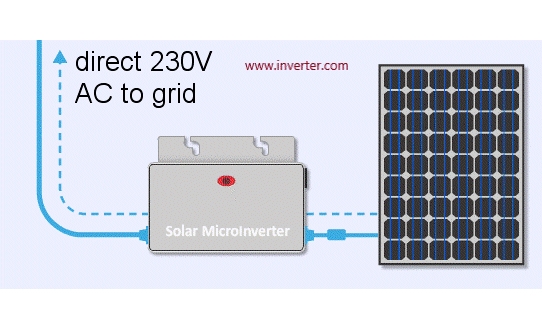As renewable energy solutions gain popularity, solar power has emerged as a leading alternative to traditional energy sources. Central to a solar power system's efficiency and reliability are the inverters, which convert the direct current (DC) generated by solar panels into alternating current (AC) usable by home appliances. Micro grid inverter is a small solar inverter used to convert DC electricity coming from one solar panel to AC electricity. It placed directly at the back of the solar panel and its typical rated power is between 100-350W. In this article, we mainly discusses whether micro inverters are worth buying.
Solar micro inverter advantages:
Suppose we have 15 solar panel arrays, with a micro grid inverter connected to each solar panel, so if any panel is subjected to underperformance issues like shadow or others, it will not affect other panels around, what a great feature!! So, the solar array will produce much power in compare to other solar inverters systems like string of central inverter, in which any under-performance panel will affect the production of the whole string.
In micro inverter solar system, you are not obliged to use the same solar panels ratings, you can use different solar panel capacities, voltage, current, and this will facilitate adding more solar panels to your existing solar system for extensions.
Moreover, all solar panel/micro inverter units will be connected in parallel to form the whole solar system at the end. This configuration provides the feature of one micro inverter failure will not affect the other system units.
All the above advantages will increase micro inverter solar system reliability, so we see manufacturers provide a warranty period of typically 15-25 year compared to 5-10 years warranty for string solar inverter and only 5 years warranty to solar central inverter.
Grid tie micro inverters convert DC to AC at the panel level, reducing the risk of high-voltage DC electricity, which can be a safety hazard. This can be particularly important in residential settings. Lastly, in case of failure in micro inverter solar system, it's easy to identify the faulty unit and also, easily to identify its place (point of connection), so you can easily and quickly isolate.
Micro inverter disadvantages:
The main disadvantage of the solar power micro inverter is the price, its more expensive than central and string inverter, usually specialists consider the inverter price per watt. And so, it turns out the micro inverter price is double or may be 3 times the central inverter price per watt.
For smaller array size, micro inverter price per watt will not be high due to low number of solar panels, also the high energy harvest we get will partially substitute the cost. So now solar cell micro inverters technically and economically succeed in residential market where limited areas and prospected shadow coming from nearby trees and objects are expected.
Solar micro inverter is typically mounted on the roof with the solar panels, exposing them to harsh environmental conditions. While they are designed to withstand such conditions, this can still lead to concerns about longevity and durability compared to indoor-mounted central inverters.
PV micro inverter types:
There are 2 types of solar micro grid inverters: single phase and three phases. 3-phase is lower cost components and higher conversion efficiency that reaches over 97%. So, 3-phase micro inverter is usually used in commercial and industrial systems in where the price is a sensitive factor and large solar array is used.
In summary, if the solar system is confirmed to be expanded in the future, micro inverters are a good choice. It is easy to continue adding a new unit to the micro inverters. The cost of adding another complete unit to a standard inverter is higher. When the panel faces multiple directions or there is a shading problem, choosing a micro inverter is definitely a value-added product.
Financial consideration:
When evaluating the worthiness of solar micro inverters, financial considerations play a crucial role. While the initial cost is higher, the potential for increased energy yield and reduced maintenance costs can offset the upfront investment over time. The precise performance optimization can lead to higher energy production, translating to greater savings on electricity bills and a shorter payback period for the investment. Additionally, the modular nature of micro inverters can lead to savings when expanding the system, as new panels can be integrated without significant additional infrastructure costs.
The decision to invest in solar grid tie micro inverters hinges on specific needs and circumstances. If maximizing energy production, enhancing monitoring capabilities, and ensuring safety are top priorities, and if the installation site has shading or complex roof structures, micro inverters can offer substantial benefits. While the higher initial cost and potential for increased maintenance may be concerns, the long-term gains in efficiency, flexibility, and system reliability often justify the investment.
For homeowners and businesses committed to leveraging the latest in solar technology to optimize their energy systems, solar micro inverters present a compelling option. Their ability to deliver high performance and adaptability in diverse conditions makes them a worthy consideration in the evolving landscape of renewable energy solutions. Buy solar micro inverters in inverter.com, the power starts from 300W, 600W, 700W, 1200W to 1400W.
